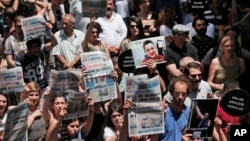The trial resumed Thursday in Turkey for journalists and editors from the pro-Kurdish newspaper Ozgur Gundem, which was shut down in August for alleged ties to the Kurdistan Workers' Party (PKK) separatist group.
Since Turkey's failed military coup last July, more than 30,000 people have been arrested in a crackdown that has targeted alleged coup supporters and backers of the country's legal pro-Kurdish movement. Yet, while opposition parties claim the crackdown is a witch hunt, there have been few large protests.
This month in Istanbul, hundreds of Kurdish construction workers took to the streets in a spontaneous protest over the arrest of pro-Kurdish Peoples' Democratic Party (HDP) co-leaders Selahattin Demirtas and Figen Yuksekdag. Within days, human rights groups claimed protesters were rounded up and arrested on anti-terror charges. The HDP blames such crackdowns for the relatively low turnout at protests following the jailing of dozens of their elected mayors and parliamentary deputies on terrorism charges.
"There is no permission for us to organize any meeting or rally; all our rallies are being banned,” said HDP parliamentary deputy Idris Baluken, speaking shortly before his arrest this month. “There is no permission for us to make press statements. If 10 people come together in the street, there is deadly intervention by the police.”
A state of emergency has been enforced since the failed coup, giving the government and authorities sweeping powers. The pro-Kurdish party has been crippled with the arrests of thousands of its local officials and activists.
Late last month, a few thousand people protested in Diyarbakir following the removal from office and arrest of the city’s co-mayors, Gultan Kisanak and Firat Anli, on terrorism charges. Diyarbakir, the largest city in the predominantly Kurdish southeast, is the center of the pro-Kurdish movement. Government advisers said they were expecting hundreds of thousands on the streets in protests in response to the arrests.
The ruling Justice and Development Party (AKP) says there has been a shift in Kurdish sentiments after PKK’s 2015 decision to extend its fight against the state into towns and cities across the predominantly Kurdish region, resulting in widespread devastation.
“There had been so many complaints by the people that the HDP municipalities were not doing their jobs and transferring their funds to the PKK terror organization,” said Muhammed Akar, leader of AKP's Diyarbakir branch. “As you can see, there has not been a reaction against these operations. Citizens do not consider this as a political operation but a judicial one. If that would not be the case, then there would be a problem for democracy which would result in societal reaction.”
The government also points to a lack of social unrest as a sign of public support for its crackdown on those alleged to be involved in July’s failed coup in which more than 240 people died.
With the number of job dismissals surpassing 100,000 and over 30,000 arrests and the closure of hundreds of critical media outlets and civil society organizations, opposition parties are shouting “witch hunt.” Rumors abound about widespread torture, charges strenuously denied by the government. The scale of the crackdown is cited by observers as creating a climate of fear.
“Fear is certainly a reason why people aren't reacting,” observes political columnist Semih Idiz of the Al-Monitor website and Hurriyet Daily News. "I know people who are not politically involved but are too scared to write anything critical about the government on social media.”
Idiz says apathy is also a factor after the failure of anti-government protests in 2013.
“After the Gezi [anti-government] demonstrations which we had a few years ago, the fact that this did not translate into any political action, there is this feeling of helplessness, of the having lost, of resignation," Idiz told VOA. "This is the idea now. I think it will take perhaps a serious economic crisis to mobilize people not along sectarian or class divisions, but generally speaking, because they are fed up.”
Analysts say the AKP remains fearful of a repeat of the nationwide anti-government Gezi protests.
A week of nationwide demonstrations against government-proposed legislation that critics claimed would free child rapists, President Recep Tayyip Erdogan made a rare intervention against his prime minister, Binali Yildirim, calling to drop the controversial law.
Erdogan’s intervention, observers suggest, was in part out of fear of the unrest getting out of control. “Erdogan thinks he can block Kurdish people's democratic reflexes and political reactions,” warns HDP deputy Baluken. “On the contrary, this piling up of anger sometimes needs a breaking point.”
With the government warning any major unrest would be treated as a coup attempt, analysts say there is little room for peaceful protests.




